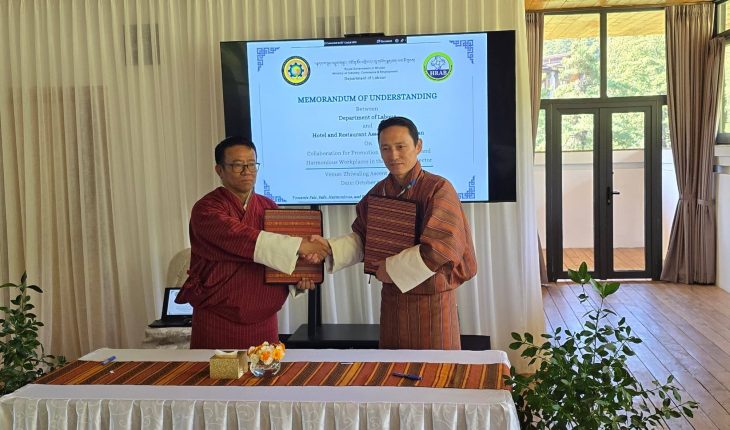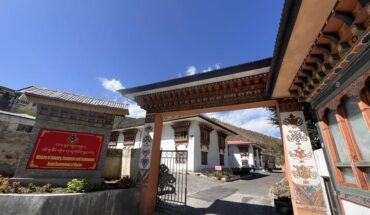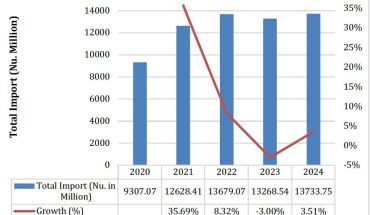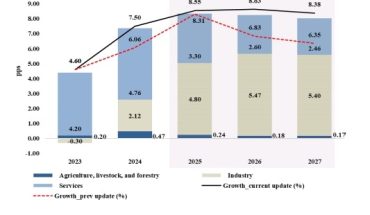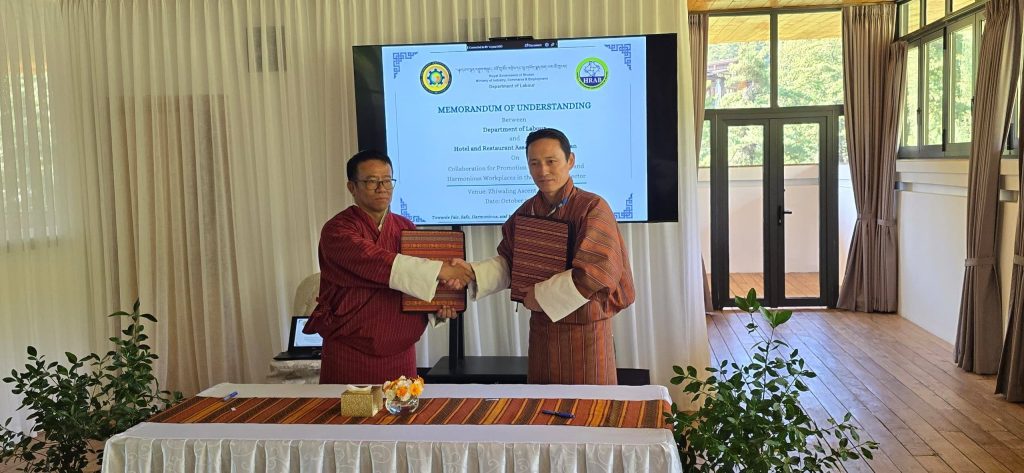
TIL BDR GHALLEY | Thimphu
In a move to strengthen labour standards and workplace harmony in Bhutan’s hospitality sector, the Department of Labour (DoL) under the Ministry of Industry, Commerce and Employment (MoICE) and the Hotel & Restaurant Association of Bhutan (HRAB) have formalized a partnership through a Memorandum of Understanding (MoU). The collaboration aims to promote decent work, compliance with labour laws, and a culture of shared responsibility between the government and private sector employers.s
The agreement marks a significant shift in Bhutan’s labour governance approach—from conventional enforcement toward self-regulation, cooperation, and proactive workplace management. By fostering mutual understanding between employers and regulators, the initiative seeks to create a fair, safe, and productive work environment across hotels, restaurants, and related service industries that employ thousands of Bhutanese and foreign workers.
Under the MoU, the DoL and HRAB will jointly work to promote compliance with the Labour and Employment Act of 2007 through a collaborative and self-regulatory framework. The approach encourages businesses to adopt internal mechanisms that uphold labssour standards while minimizing dependency on external enforcement. Employers will be guided to implement Internal Service Rules (ISR) that define clear workplace policies, grievance redressal systems, and procedures for early dispute resolution.
The partnership also focuses on ensuring fair wages, opportunities for career development, and decent working conditions. Both parties recognize that a motivated and fairly treated workforce contributes directly to service quality and the growth of Bhutan’s tourism and hospitality industry—a sector that has played a crucial role in national employment and economic recovery post-pandemic.
In addition to promoting compliance, the agreement outlines joint initiatives for capacity building. The DoL and HRAB will conduct training programs and awareness sessions on labour standards, occupational safety, and ethical employment practices. These activities are designed to build awareness among employers, managers, and employees about their respective rights and responsibilities, thereby preventing disputes before they arise.
A notable aspect of the collaboration is its emphasis on responsible recruitment and management of foreign workers, a recurring challenge in the hospitality sector. By setting transparent and fair recruitment procedures, the MoU seeks to minimize exploitation and ensure that both Bhutanese and expatriate employees are treated with dignity and fairness.
The initiative also aligns with Bhutan’s national vision of fostering “decent work for all,” a key component of the country’s commitment to inclusive and sustainable economic growth. The partnership aims to serve as a model for other industries, demonstrating that collaborative governance can be more effective than punitive approaches in maintaining labour standards.
The DoL, through this partnership, is signaling a new regulatory direction—one that prioritizes education, guidance, and collaboration over punitive measures. This self-regulatory model empowers employers to take greater ownership of workplace compliance while allowing the department to focus its enforcement capacity on serious or repeated violations. Such a shift is expected to reduce administrative burdens, promote trust, and encourage a culture of continuous improvement in workplace management.
From the private sector perspective, the MoU reflects HRAB’s commitment to uphold ethical and professional standards across its member establishments. By agreeing to partner with the DoL, HRAB demonstrates the industry’s readiness to adopt a proactive approach toward compliance rather than viewing regulations as external impositions. The association’s participation ensures that the voices and realities of business owners are represented in shaping practical and achievable compliance strategies.
For workers, the collaboration holds the promise of more transparent systems for addressing workplace grievances and career progression. By institutionalizing internal mechanisms for dispute resolution, the partnership aims to reduce conflicts that often arise from misunderstandings or unclear employment terms. Employees are expected to benefit from clearer communication, improved working conditions, and a greater sense of security in their workplaces.
This MoU also reinforces Bhutan’s evolving labour policy landscape, where shared accountability is seen as key to achieving long-term sustainability in employment relations. The partnership between DoL and HRAB embodies the principle that decent work is not solely a regulatory obligation but a joint responsibility between the state, employers, and workers.
Ultimately, the initiative reflects a growing maturity in Bhutan’s approach to labour governance. By encouraging dialogue, joint problem-solving, and mutual respect, it seeks to transform the regulatory culture from one of compliance enforcement to one of partnership and shared purpose. The DoL’s facilitative role will help industries navigate challenges while maintaining fairness and protecting workers’ rights, ensuring that Bhutan’s hospitality sector remains both competitive and socially responsible.
As Bhutan continues to rebuild its tourism and service sectors, the DoL-HRAB collaboration stands as an important step toward creating workplaces that value both productivity and human dignity. Through this partnership, the government and private sector are setting the foundation for a labour ecosystem grounded in trust, accountability, and the collective pursuit of national prosperity.

